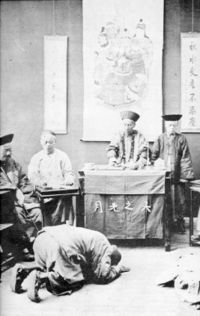- Nucai
-
Nucai (Chinese: 奴才) is a Chinese term that can be translated as flunkey, lackey, yes-man, servant, slave, or a person of unquestioning obedience. It originated in the nomadic tribes of northern China as a negative and derogatory term, often reserved for insult for someone perceived to be useless or incompetent. However, it was used most prominently in the Qing Dynasty as a deprecatory first-person pronoun by Manchu officials at court when addressing the Emperor. Han Chinese officials were not allowed to use the term for self-address; they used Chen (Chinese: 臣) instead.
Contents
Usage
During the Qing Dynasty, addressing oneself as Nucai was became a sort of "privilege" reserved for ethnic Manchu officials. Officials of Han Chinese origin were forbidden to address themselves as Nucai, and must address themselves as Chen (臣, literally "your subject").[1] The rule was applied both in written and spoken situations. Such a rule surrounding the term Nucai reflected that the relationship between Manchu officials and the Emperor as that between "master and servant" in a household, while that between Han Chinese officials and the Emperor as simply between ruler and subject.[1] The equivalent Manchu term for Nucai is Booi Aha. The exclusivity of the term Nucai meant that Han Chinese officials are given lower status at court, even though Chen was historically considered as a more prestigious form of self-address.
See also
- Slavery in seventeenth-century China
- Coolies
References
- ^ a b Yi, Shuisheng (2006-10-03). "“奴才”一称的特殊地位 (The special status of "nucai")" (in Chinese). Xinhua. http://news.xinhuanet.com/theory/2006-10/03/content_5144504.htm. Retrieved 29 November 2009.
Additional source
- (Chinese)Hudong Baike Entry
- (Chinese)古今的奴才语言和奴才地位:满清奴才地位也特殊 汉人连奴才都当不上Google translation
- (Chinese)李新宇:皇帝崇拜与奴才意识Google translation
Categories:- Chinese culture
- Qing Dynasty
- Chinese words and phrases
Wikimedia Foundation. 2010.

